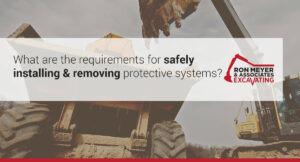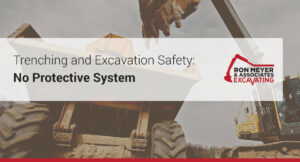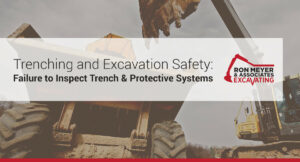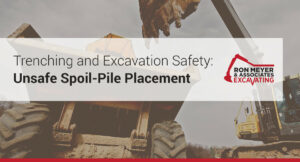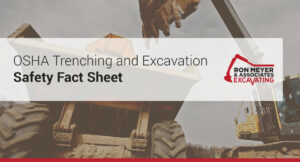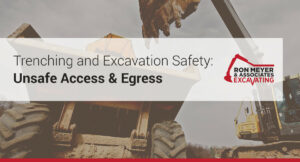The Excavation standards require employers to take certain steps to protect workers when installing and removing support systems. For example: Members of support systems must be securely connected to prevent sliding, falling, kickouts or predictable failure. Support systems must be installed and removed in a manner that protects workers from cave-ins and structural collapses and […]
Excavation & Trenching Safety
Read posts about Excavation & Trenching Safety from Ron Meyer & Associates Excavating, West Michigan excavation contractors.
Trenching and Excavation Safety: No Protective System
Cave-ins are perhaps the most feared trenching hazard. But other potentially fatal hazards exist, including asphyxiation due to lack of oxygen in a confined space, inhalation of toxic fumes, drowning, etc. Electrocution or explosions can occur when workers contact underground utilities. OSHA requires that workers in trenches and excavations be protected, and that safety and […]
Trenching and Excavation Safety: Failure to Inspect Trench & Protective Systems
Cave-ins are perhaps the most feared trenching hazard. But other potentially fatal hazards exist, including asphyxiation due to lack of oxygen in a confined space, inhalation of toxic fumes, drowning, etc. Electrocution or explosions can occur when workers contact underground utilities. OSHA requires that workers in trenches and excavations be protected, and that safety and […]
Trenching and Excavation Safety: Unsafe Spoil-Pile Placement
Cave-ins are perhaps the most feared trenching hazard. But other potentially fatal hazards exist, including asphyxiation due to lack of oxygen in a confined space, inhalation of toxic fumes, drowning, etc. Electrocution or explosions can occur when workers contact underground utilities. OSHA requires that workers in trenches and excavations be protected, and that safety and […]
OSHA Trenching and Excavation Safety Fact Sheet
http://www.mdprestaurants.com/viagra7662.html Trenching and Excavation Safety Two workers are killed every month in trench collapses.The employer must provide a workplace free of recognized hazards that may cause serious injury or death. The employer must comply with the trenching and excavation requirements of 29 CFR 1926.651 and 1926.652 or comparable OSHA-approved state plan requirements. An excavation is […]
Trenching and Excavation Safety: Unsafe Access & Egress
Cave-ins are perhaps the most feared trenching hazard. But other potentially fatal hazards exist, including asphyxiation due to lack of oxygen in a confined space, inhalation of toxic fumes, drowning, etc. Electrocution or explosions can occur when workers contact underground utilities. OSHA requires that workers in trenches and excavations be protected, and that safety and […]
